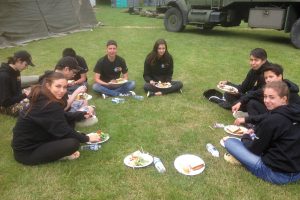RAVEN program’s Culture Camp brings together First Nations youth
By Lookout on Jul 22, 2016 with Comments 0

Students enjoy lunch at Raven Culture Camp in Nanoose Bay. Photos by Rachel Lallouz
Rachel Lallouz, Staff Writer ~
The RAVEN program’s Culture Camp Opening Ceremony took place on June 11 in Nanoose Bay, B.C., to mark the beginning of a three-and-a-half-day camp where the 29 RAVEN participants learned about a variety of Aboriginal spiritual practices and beliefs in a military-structured setting.
The students gathered in a semi-circle in a field while Brent Edwards, Chief of the Nanoose First Nations, was gifted with sweet grass and flint by Ed Neveau, RAVEN Culture Camp coordinator from Wanipigow, Manitoba, and his wife Madelain Hardisty-Neveau.
“I think Canada has diversified now and we’ve seen many First Nations with a rich history of serving in armed forces,” said Chief Edwards. “Culture Camp brings together youth from different backgrounds to learn from each other.”
Culture Camp marks the initial portion of the six-week RAVEN program, in which Aboriginal youth are selected from Canadian Armed Forces (CAF) recruiting centres to complete basic military qualification at CFB Esquimalt before graduating in late August.
“When the kids come here, whether from a reserve or the city, some have limited cultural knowledge,” explains Ed. “We will incorporate Aboriginal culture through the entire camp and all events here.”
The students, ages 16 to 24, come from a wide range of Aboriginal nations across Canada, including Mohawk, Cree, Ojibwe, Metis and Inuit.
“It’s been fast paced and I love the culture aspect of it so far,” says Julia Jacobs, a 24-year-old Mohawk youth from Montreal. She says that when the program has completed, she’ll begin studies at Concordia University in First People’s Studies, and also plans to join the Reserve Force at the same time.
During the course of the Culture Camp, participants awoke at 4 a.m. and spent their days participating in Aboriginal ceremonies, bonding exercises, sports games, and listening to presentations on colonialism and Metis and Inuit culture. Nights were spent in army tents that students learned to set up on the first day.
“They were also responsible for watching the ceremonial fire, too,” says Ed, who explained that the fire was kept burning at the edge of a field of Culture Camp for the entirety of the three and a half days.
Supporting the youth’s participation in activities were retired military members and Aboriginal counsellors Margaret Bauereiss and Joe Thorne.
Filed Under: Top Stories
About the Author:





